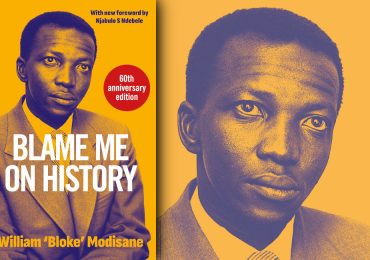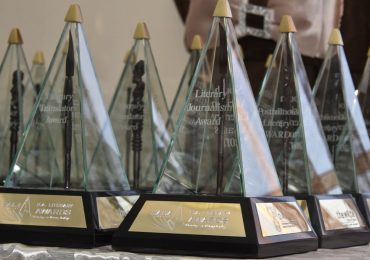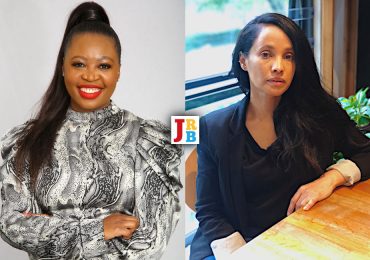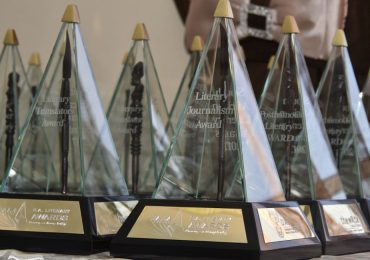City Editor Niq Mhlongo, having just won his first South African prize, shares his gripes and observations on that strange species of accolade, the literary award.
Header image: The 2019 Media24 Books Prizes winners, from left to right: Lodewyk G du Plessis (retired judge Andries Buys), Sally Partridge, Theodore Key, Carolyn Meads (receives the prize on behalf of Gabeba Baderoon), Rob Rose and Niq Mhlongo.
Three days after my forty-sixth birthday, on 13 June 2019, my collection of short stories, Soweto, Under the Apricot Tree, won the Herman Charles Bosman Prize for English Fiction. This is the first literary prize I have won in South Africa. To be honest, I never expected to win the prize, which came with R35,000 in cash. I was convinced that Nozizwe Cynthia Jele’s The Ones with Purpose was the obvious choice. I read the book last year when it came out, and I rate it among the best of South Africa’s novels.
I’m very sceptical about book prizes and always have mixed feelings when they are announced. My past experiences with certain South African literary prizes made me cynical. Yes, I’m excited by shortlists like everyone else. I also love winning—who doesn’t?! Being shortlisted comes with lots of benefits and literary opportunities. Although I’ve never got any government grants from the National Arts Council, I’m sure to mention all my long- and shortlistings at every opportunity, to fool whomever is on the NAC’s selection committee. I tell everyone about my K Sello Duiker shortlisting in 2007, the Sunday Times shortlist in 2008, the MNet Literary Award shortlist in 2008, and so forth, especially when I apply for residencies around the world. I also think that I get invited to literary festivals both in South Africa and abroad because of some of these shortlists.
But let me share with you one of my most embarrassing stories about South African book prizes. For those of you who don’t know, this was not the first time that I was shortlisted for the Herman Charles Bosman. In 2008, my second novel, After Tears, was shortlisted, together with Gail Dendy’s The Lady Missionary. I was flown from Johannesburg by Media24 to attend the ceremony in Franschhoek. My publisher kept convincing me that this was my prize. I was also highly encouraged by the fact that my dear friends and fellow scribes Simão Kikamba and Kgebetli Moele had won it in 2006 and 2007, respectively.
Come the announcement, and we were told that there was no winner of the Herman Charles Bosman Prize that year. My and Gail’s works were adjudged to not really be ‘there’, in terms of the Bosman’s standards. However, we were given honourable mentions for our efforts, and a consolation prize of R15,000. They split the R30,000 purse (the amount then) between the two of us.
Now, imagine how I felt when I was shortlisted for the same prize eleven years later, and this time for a collection of short stories. The very same Media24 flew me to Cape Town, hired me a nice B-class car, and booked me into a posh hotel. My mind was not on winning. I was happy to take a break from the manuscript that I’m busy writing and to catch up with a few friends that I have not seen in a while. Come the announcement on 13 June, and I felt a shock when my name was read out. I said to myself, ‘finally I meet the Bosman standard of writing’.
The Bosman was not my only bittersweet experience with South African literary prizes. In 2007, Zukiswa Wanner and I were shortlisted for the K Sello Duiker Memorial Literary Award, part of the South African Literary Awards (the SALAs). Bruce Ngobeni, the other author nominated with us, was a Xitsonga novelist who, I’ve sadly heard, has since passed away. Before the announcements began, one of the judges called me aside. He said to me that he was unhappy with the way the winner had been selected for my category. Apparently there had been serious lobbying in the boardroom for Ngobeni. Some judges felt that he had to win, to promote indigenous languages. One particular judge for this award even confided in me that since he couldn’t read or understand Xitsonga, he was only given a summary of what the book was about. He was upset that he was forced to go with the decision. On top of that, according to the judge, the winner was older than thirty-five years of age. Back then, the prize was for a young author below thirty-five.
I’m thus very sceptical about South African literary prizes. Sometimes they don’t reflect the truth about the our literary landscape. There are a number of excellent books that I think should not have been overlooked for prizes. It still baffles me that A Man Who is Not A Man by Thando Mgqolozana has not won any South African literary prize, given the theme it bravely explores. I nearly gave up with literary prizes when Fred Khumalo’s Dancing The Dance Drill was not even shortlisted for the Sunday Times Barry Ronge Fiction Prize.
There is hope beyond South Africa, however. For example, my debut novel, Dog Eat Dog, didn’t make it to any South African shortlist, but it won a Spanish literary award called the Internacionale La Mar de Letras in 2006. One of the most exciting moments in my life came when I was invited to Cartegena, Spain to accept the award. The great Mahotella Queens performed on stage, especially for me, in that beautiful Mediterranean city. That same year in December, Dog Eat Dog was featured in the New York Times as part of a story on the most irreverent voices of South African letters. Leading newspapers across Europe also featured the book, and I was invited to prestigious literary events across the globe. The book was later translated into Italian and Spanish, and was co-published in the United States by Ohio Press. It was prescribed in several universities, including Vanderbilt, New York University, and Haverford College.
I’m not the only person, of course, who is a bit sceptical about literary prizes. Controversies do not happen in South Africa alone. In 2001, AL Kennedy, who sat as a judge of the 1996 Booker Prize, called it ‘a pile of crooked nonsense … the winner determined by who knows who, who’s sleeping with who, who’s selling drugs to who, who’s married to who, whose turn it is’. I tend to agree with the gist of this claim. In addition to the experiences I’ve shared above, there have been, down the years, a few instances where literary prizes in South Africa were awarded under controversial circumstances, including judges having special relationships with authors. I guess some of you will know what I’m talking about, so I won’t say any names.
Each year we all shout loudest from Africa to the ears of the members of the Swedish Academy that the great Ngũgĩ wa Thiong’o deserves the Nobel. But who is listening to us? I think it would be unfair for me to paint all award decisions with the same brush, though. Sometimes we authors expect a lot from the impossible, and it often happens that one finds oneself shortlisted with a crop of great books. How, then, to choose? In 2008, for example, After Tears was shortlisted for the Sunday Times Fiction Prize with some terrific books: The Song Before it is Sung by Justin Cartwright (RIP), Diary of a Bad Year by JM Coetzee, Blood Kin by Ceridwen Dovey, and The Fence by Andrew Gray. Dovey beat all of us, including the Nobel Laureate. On that note, I would like to wish all those who are longlisted for this year’s Sunday Times Literary Awards good luck. I’m looking forward to seeing who wins.
- Niq Mhlongo is the City Editor. Follow him on Twitter.






One thought on “[City Editor] Niq Mhlongo laments the caprice—and celebrates the excitement—of literary awards, and shares his own bittersweet experience”